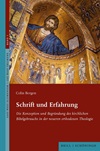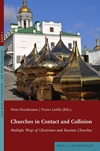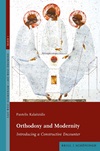|
|
|
East West Ecumenism - Ost West Ökumene |
 |
Colin D. Bergen
Schrift und Erfahrung
Ferdinand Schöningh, 2024, 500 Seiten, Gebunden,
978-3-506-79661-5
99,00 EUR
 |
East West Ecumenism - Ost West Ökumene
Band 3
Die Konzeption und Begründung des kirchlichen Bibelgebrauchs
in der neueren orthodoxen Theologie
In der Bibelauslegung der
modernen westlichen Theologie spielt die spirituelle Erfahrung des
Auslegers zumeist keine Rolle. Vor allem in der protestantischen
Tradition hat sich die Auslegung der Bibel von Anfang an unter starkem
Bezug auf die Wissenschaften entwickelt. Der Bibelwissenschaftler ist
hier der Experte - nicht der Heilige! Ganz anders die Schriftauslegung
der neueren orthodoxen Theologie. Diese knüpft bewusst an ihre
frühchristlichen Ursprünge an und zeichnet sich durch eine enge Bindung
an die kirchliche und liturgische Erfahrung aus. Ausgehend von diesem
Befund untersucht die vorliegende Arbeit die spezifisch theologische
Struktur des ostkirchlichen Bibelgebrauchs und beleuchtet ihren
möglichen Beitrag zur Wiedergewinnung der Nähe von Schrift und Erfahrung
im Westen. |
 |
Heta Hurskainen
Churches in Contact and Collision
Ferdinand Schöningh, 2023, 200 Seiten, Gebunden,
978-3-506-79385-0
118,00 EUR
 |
East West Ecumenism - Ost West Ökumene
Band 2
Multiple Ways of Ukrainian and Russian Churches
Language:
English
Orthodox churches in Ukraine and Russia share a common
ecclesiastical tradition but differ in their views on practicing and
interpreting it. To bolster their own views, different Orthodox churches
emphasize different aspects of history, and ›forget‹ others, not
favorable for their interpretations. These intentional memorizing also
influence on the churches’ reflection of their position and role in
society at large. Interpretations of ecclesiastical tradition also
influence the Orthodox churches’ reactions to the other churches in
Ukraine. Abroad, ecclesiastical organizations, especially ecumenical
bodies are also influenced by the Ukrainian Orthodoxy, and have
influence on the Ukrainian and Russian Orthodoxy, when recognizing or
leaving without recognition the multiplicity of the Orthodox faith in
Ukraine and Russia.
Preliminary Material |
 |
Pantelis Kalaitzidis
Orthodoxy and Modernity
Ferdinand Schöningh, 2025, 200 Seiten, Hardcover,
978-3-506-79534-2
109,00 EUR
 |
East West Ecumenism - Ost West Ökumene
Band 1
Introducing a Constructive Encounter
Language: English
Did Orthodoxy come to a halt before modernity? Does Orthodox Christian
theology function only in traditional contexts borrowing schemes and
forms of rural society, to which the liturgical and theological
symbolisms, the rhetoric models of preaching, the structures of church
administration and its views on the relation between religion, politics,
and secular society are closely linked?Has Orthodoxy accepted the
consequences of modernity or the Orthodox still feel a nostalgia for
pre-modern forms of organization and structures of a glorified past,
following in this way fundamentalism? Did even the movement called
Return to the Fathers, as it was understood, and in spite of its
initially renewal character, functioned unwittingly as a barrier,
against modernity and its challenges?Modernity and post-modernity
constitute, however, the broader historical, social and cultural context
within which the Church is called to accomplish its mission and to
ceaselessly incarnate the Christian truth. |
|
|


